必修4 Module 3 Body Language and Non-Verbal Communication Listening and vocabulary 课件(35张PPT)
文档属性
| 名称 | 必修4 Module 3 Body Language and Non-Verbal Communication Listening and vocabulary 课件(35张PPT) |
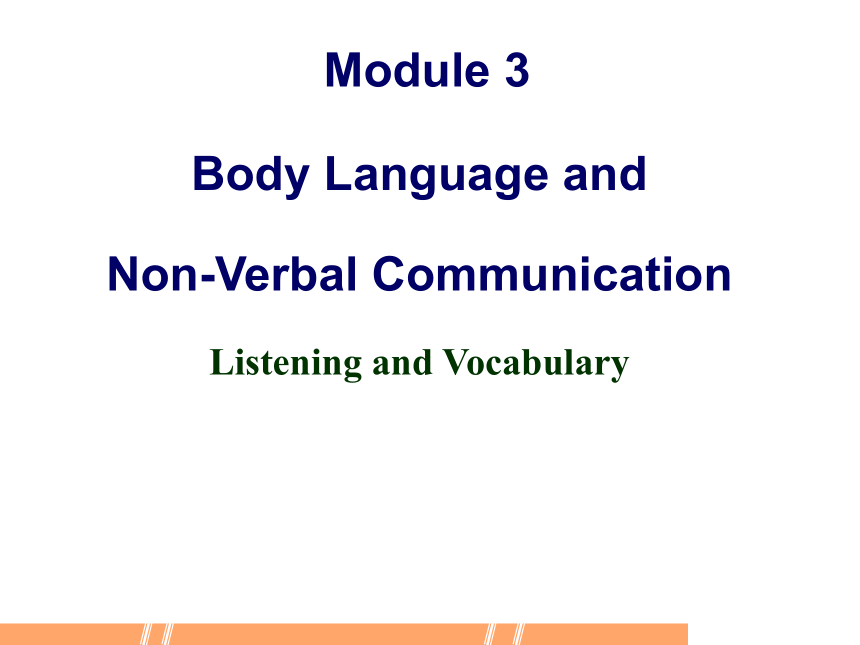
|
|
| 格式 | zip | ||
| 文件大小 | 397.0KB | ||
| 资源类型 | 教案 | ||
| 版本资源 | 外研版 | ||
| 科目 | 英语 | ||
| 更新时间 | 2020-05-16 00:00:00 | ||
图片预览

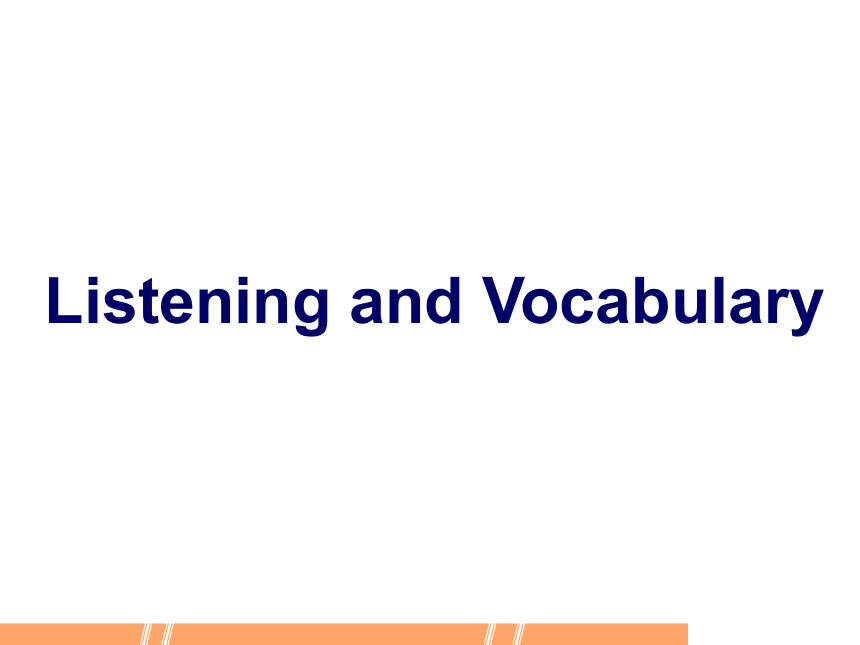
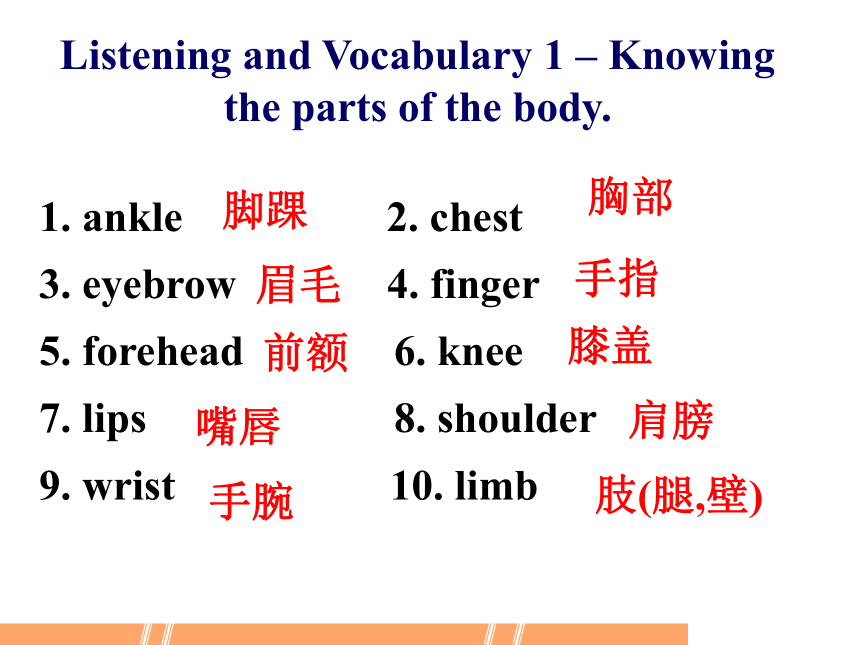
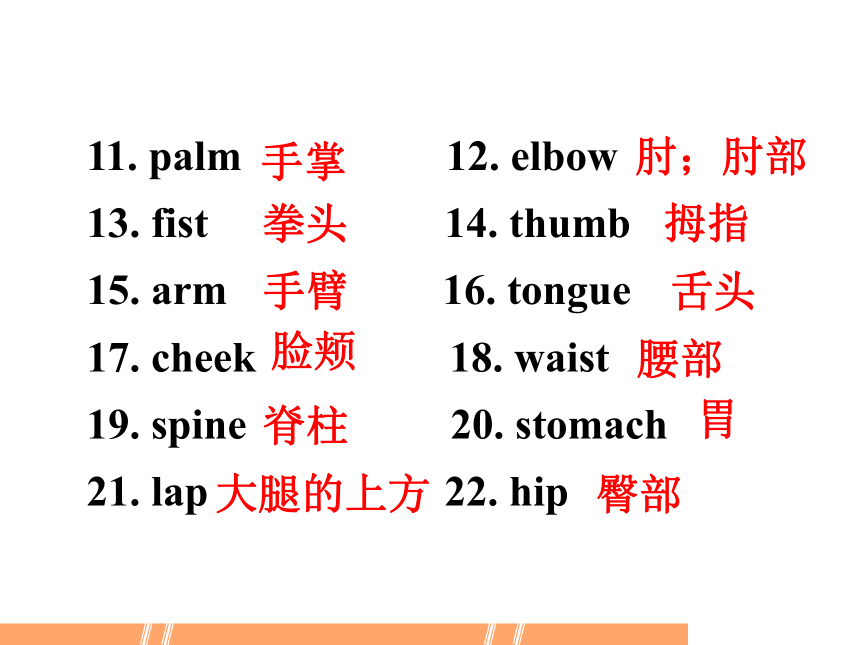

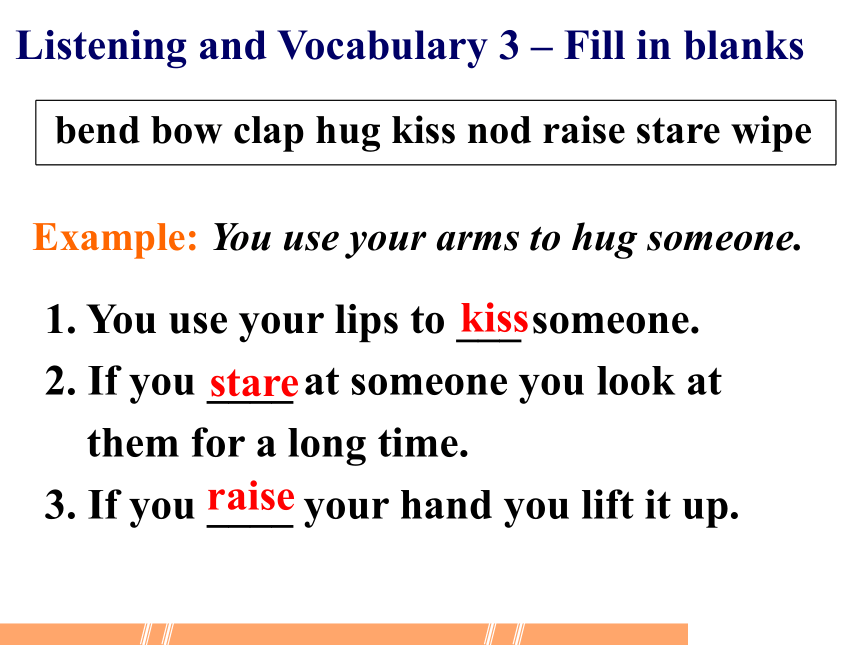
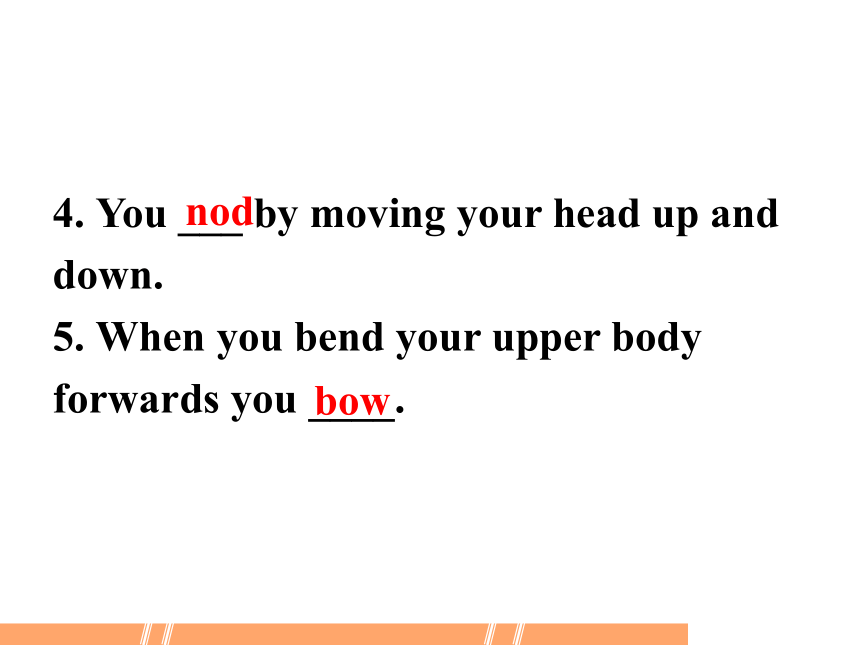

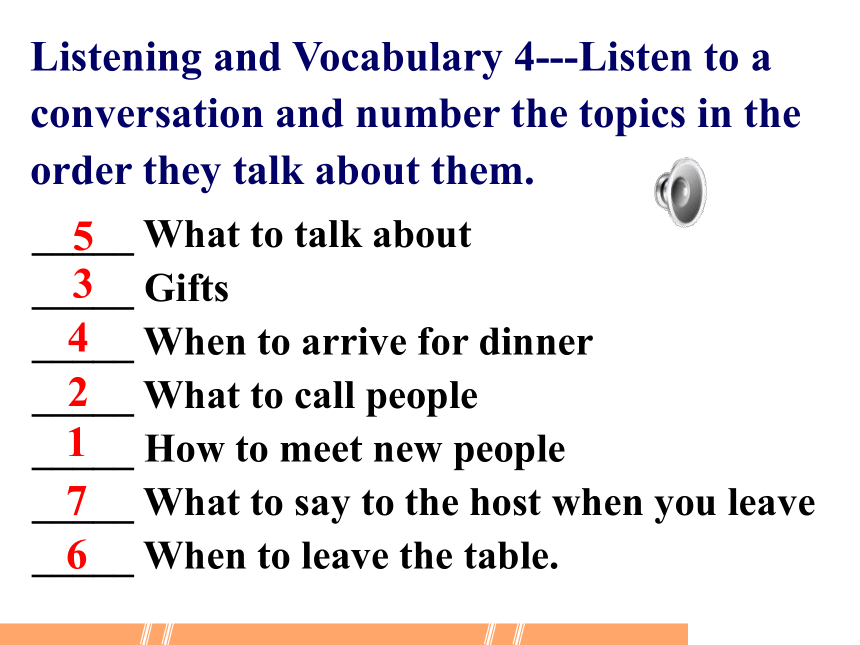
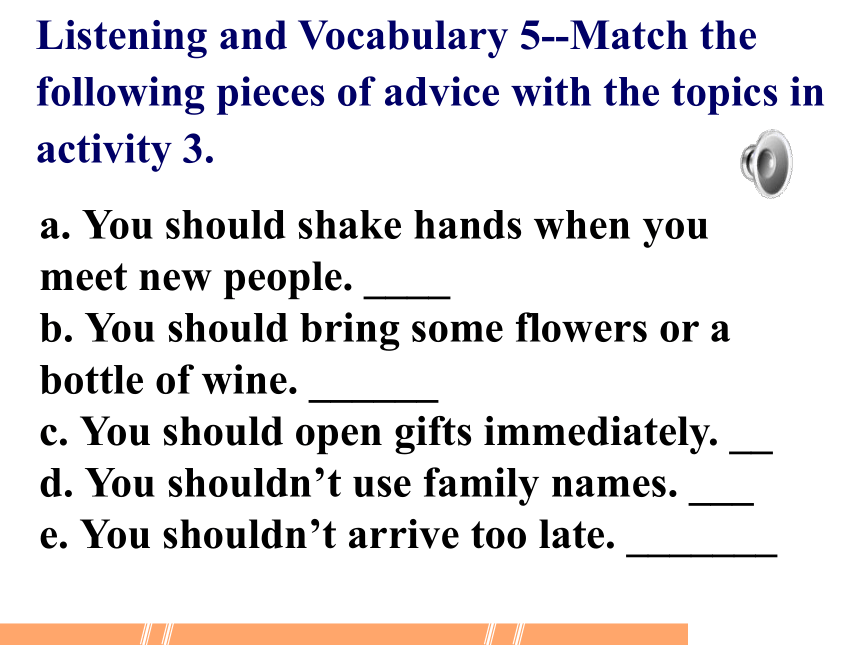
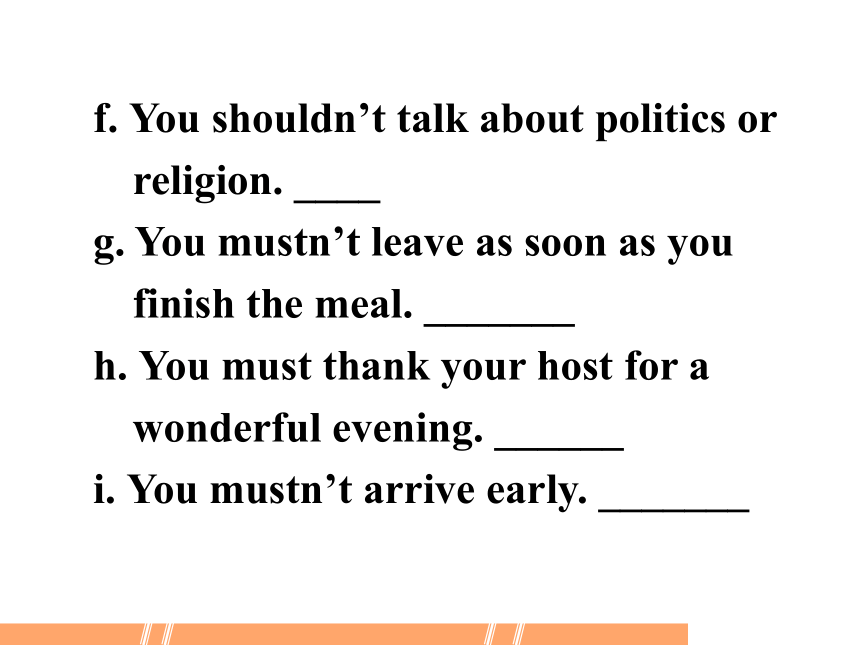
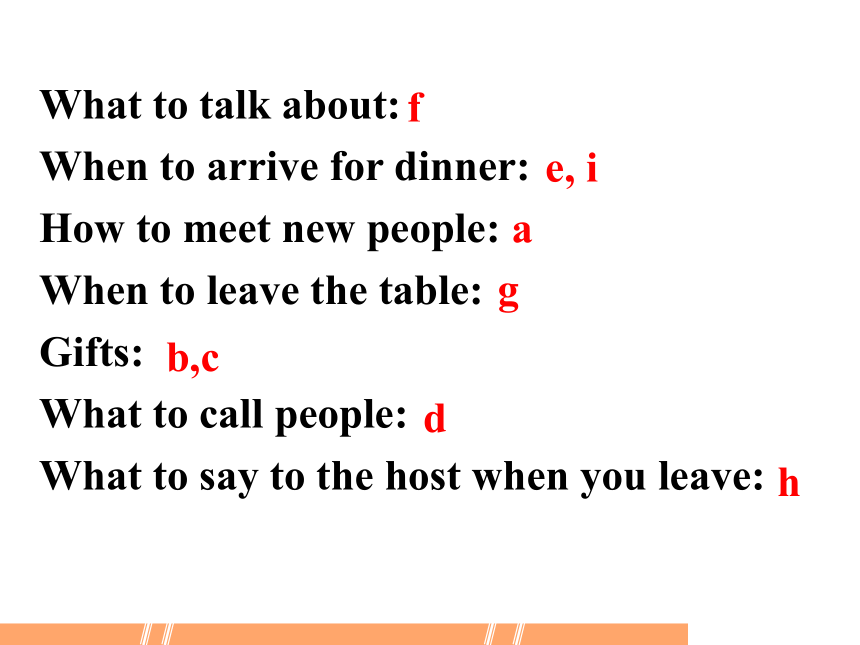
文档简介
(共35张PPT)
Module 3
Body Language and
Non-Verbal Communication
Listening and Vocabulary
Listening and Vocabulary
Listening and Vocabulary 1 – Knowing the parts of the body.
1. ankle 2. chest
3. eyebrow 4. finger
5. forehead 6. knee
7. lips 8. shoulder
9. wrist 10. limb
脚踝
胸部
眉毛
手指
前额
嘴唇
手腕
膝盖
肩膀
肢(腿,壁)
11. palm 12. elbow
13. fist 14. thumb
15. arm 16. tongue
17. cheek 18. waist
19. spine 20. stomach
21. lap 22. hip
手掌
肘;肘部
拳头
拇指
手臂
舌头
脸颊
腰部
脊柱
胃
大腿的上方
臀部
Look at the picture and say the name of the parts of your body.
Example: You use your arms to hug someone.
1. You use your lips to ___ someone.
2.?If you ____ at someone you look at them for a long time.
3.?If you ____ your hand you lift it up.
kiss
stare
raise
Listening and Vocabulary 3 – Fill in blanks
bend bow clap hug kiss nod raise stare wipe
4.?You ___ by moving your head up and
down.
5.?When you bend your upper body
forwards you ____.
nod
bow
6.?You have to ____ your knees to sit
down.
7.?If you’re hot you can ____ the sweat
from your forehead
8.?At the end of a concert or a play it is
usual to ____.
bend
wipe
clap
lift sb. / sth. up 将某人 / 某物抬起, 举起
Listening and Vocabulary 4---Listen to a conversation and number the topics in the order they talk about them.
_____ What to talk about
_____ Gifts
_____ When to arrive for dinner
_____ What to call people
_____ How to meet new people
_____ What to say to the host when you leave
_____ When to leave the table.
1
2
3
4
5
6
7
a.?You should shake hands when you
meet new people. ____
b.?You should bring some flowers or a
bottle of wine. ______
c.?You should open gifts immediately. __
d.?You shouldn’t use family names. ___
e.?You shouldn’t arrive too late. _______
Listening and Vocabulary 5--Match the following pieces of advice with the topics in activity 3.
f.?You shouldn’t talk about politics or religion. ____
g. You mustn’t leave as soon as you finish the meal. _______
h.?You must thank your host for a wonderful evening. ______
i.?You mustn’t arrive early. _______
What to talk about:
When to arrive for dinner:
How to meet new people:
When to leave the table:
Gifts:
What to call people:
What to say to the host when you leave:
f
e, i
a
g
b,c
d
h
Listening and Vocabulary 6- Fill in the blanks with the missing words.
B=Bill, L=Li Hong
B: Hi, Li Hong. How are you doing? I hear
you’re ______ to the states.
L: That’s right, Bill. I’m going to stay in
America for ________ months.
B: That’s great. But you look a bit
_________. What’s the problem?
L: Look, Bill, can I ask you a _______? I
off
three
fed up
favor
need some advice about what to do… or
better still, what not to do there.
B: Oh you mean _________? Of course.
L: For example, what should I do when I
meet new people?
B: Shake hands at the first meeting.
________they are, Americans don't
usually like to call each other by their
family name: it sounds too ______.
customs
Whoever
formal
L: What shall I do if I’m _______ to
dinner?
B: When you’re invited to someone’s
home, _____________________ bring a
gift for your host. It doesn’t have to be
something expensive, perhaps some
flowers or a bottle of wine. And
_________ for people to open gifts when
invited
it’s a good idea to
it’s usual
they receive them, so don’t be ________.
__________________we do things in the
States.
L: OK.
B: Be _____________ on time, not very
early and not very late.
surprised
That’s the way
more or less
L: What _______ can I talk about?
B: It’s best to avoid any __________
conversation topics. So avoid politics or
________ completely. If your mind
_________, try not to _____. Remember to smile and ____________
on earth
heavy-going
religion
goes blank
panic
stay relaxed
and unless you’ve very unlucky you’ll
soon think of something. In difficult
situations I always talk about the weather.
L: Oh, good idea.
B: If you have a meal don’t start eating
before everyone is ______. And ________
you do, don’t leave immediately after the
meal is finished. That could __________.
L: Right.
B: But when you ___ _____, __________
served
whatever
seem rude
do leave
be sure to
thank your host for “a wonderful
evening”. Oh, and one last thing to
remember…
L: Yes?
B: I know you’ll really enjoy yourself so
be sure to ___________________.
have a great time
Everyday English
Everyday English -1 Decide what the phrases
mean?
1. Can I ask you a favour?
(a) Can I do something for you?
(b) Can you do something for me?
2. How are you doing?
(a) How are you?
(b) What are you doing?
3. What on earth can I talk about?
(a) There’s lots to talk about.
(b) I don’t know what to talk about.
4. Have a great time!
(a) Enjoy yourself.
(b) Stay a long time.
Function
Function 1--Look at the sentences in
Listening and vocabulary activity 4 and
complete the sentences below with should or
must.
Sentences in Listening and vocabulary
activity 4:
You should shake hands when you meet new people.
You should bring some flowers or a bottle of wine.
You should open gifts immediately.
You shouldn’t use family names.
You shouldn’t arrive too late.
You shouldn’t talk about politics or religion.
You mustn’t leave as soon as you finish the meal.
You must thank your host for a wonderful evening.
You mustn’t arrive early.
We use the modal verb ______ to give advice.
We use the modal verb ______ to give strong advice.
You ______ means It’s a good idea to ….
You ____ means It’s very important to …
should
must
should
must
Conclusion
1. In France you ______ shake hands every time you say hello and goodbye.
2. In Thailand you _______ touch someone on the head, even by accident.
should
mustn’t
Function 2--Work in pairs. Guess the customs by completing the advice with should, shouldn’t, must or mustn’t.
Do you know…?
3. In Spain you ______ wait until 10 pm before you have dinner.
4. In Japan you ________ give a penknife as a present.
5. In Russia you ____ make a toast every time you take a sip from your glass.
should
shouldn’t
must
Speaking
Work in pairs. Do the role-play.
Student A: An American visitor to China.
Ask B for advice on Chinese customs.
Student B: A Chinese student. Student
A’s friend.
Give B advice using should or must or
sentences beginning with if.
Speaking 1 – Role-play on Page 27.
Situations:
be introduced to others; be invited;
meet someone familiar; talk to people; say goodbye…
Could you please do me a favor?
Could you help me with…?
Could you give me a hand, please?
Could you please do something for me?
Can I help you?
What can I do for you?
Would you like some help?
Is there anything (else) I can do for you?
Thanks.
Yes, please.
That’s very kind/nice of you.
It’s all right. Thank you.
No, thanks. I can manage it myself.
Asking for help
Offering help
Accepting help
Refusing help
Homework
Review what you have learned.
Get ready for the next period of class.
Module 3
Body Language and
Non-Verbal Communication
Listening and Vocabulary
Listening and Vocabulary
Listening and Vocabulary 1 – Knowing the parts of the body.
1. ankle 2. chest
3. eyebrow 4. finger
5. forehead 6. knee
7. lips 8. shoulder
9. wrist 10. limb
脚踝
胸部
眉毛
手指
前额
嘴唇
手腕
膝盖
肩膀
肢(腿,壁)
11. palm 12. elbow
13. fist 14. thumb
15. arm 16. tongue
17. cheek 18. waist
19. spine 20. stomach
21. lap 22. hip
手掌
肘;肘部
拳头
拇指
手臂
舌头
脸颊
腰部
脊柱
胃
大腿的上方
臀部
Look at the picture and say the name of the parts of your body.
Example: You use your arms to hug someone.
1. You use your lips to ___ someone.
2.?If you ____ at someone you look at them for a long time.
3.?If you ____ your hand you lift it up.
kiss
stare
raise
Listening and Vocabulary 3 – Fill in blanks
bend bow clap hug kiss nod raise stare wipe
4.?You ___ by moving your head up and
down.
5.?When you bend your upper body
forwards you ____.
nod
bow
6.?You have to ____ your knees to sit
down.
7.?If you’re hot you can ____ the sweat
from your forehead
8.?At the end of a concert or a play it is
usual to ____.
bend
wipe
clap
lift sb. / sth. up 将某人 / 某物抬起, 举起
Listening and Vocabulary 4---Listen to a conversation and number the topics in the order they talk about them.
_____ What to talk about
_____ Gifts
_____ When to arrive for dinner
_____ What to call people
_____ How to meet new people
_____ What to say to the host when you leave
_____ When to leave the table.
1
2
3
4
5
6
7
a.?You should shake hands when you
meet new people. ____
b.?You should bring some flowers or a
bottle of wine. ______
c.?You should open gifts immediately. __
d.?You shouldn’t use family names. ___
e.?You shouldn’t arrive too late. _______
Listening and Vocabulary 5--Match the following pieces of advice with the topics in activity 3.
f.?You shouldn’t talk about politics or religion. ____
g. You mustn’t leave as soon as you finish the meal. _______
h.?You must thank your host for a wonderful evening. ______
i.?You mustn’t arrive early. _______
What to talk about:
When to arrive for dinner:
How to meet new people:
When to leave the table:
Gifts:
What to call people:
What to say to the host when you leave:
f
e, i
a
g
b,c
d
h
Listening and Vocabulary 6- Fill in the blanks with the missing words.
B=Bill, L=Li Hong
B: Hi, Li Hong. How are you doing? I hear
you’re ______ to the states.
L: That’s right, Bill. I’m going to stay in
America for ________ months.
B: That’s great. But you look a bit
_________. What’s the problem?
L: Look, Bill, can I ask you a _______? I
off
three
fed up
favor
need some advice about what to do… or
better still, what not to do there.
B: Oh you mean _________? Of course.
L: For example, what should I do when I
meet new people?
B: Shake hands at the first meeting.
________they are, Americans don't
usually like to call each other by their
family name: it sounds too ______.
customs
Whoever
formal
L: What shall I do if I’m _______ to
dinner?
B: When you’re invited to someone’s
home, _____________________ bring a
gift for your host. It doesn’t have to be
something expensive, perhaps some
flowers or a bottle of wine. And
_________ for people to open gifts when
invited
it’s a good idea to
it’s usual
they receive them, so don’t be ________.
__________________we do things in the
States.
L: OK.
B: Be _____________ on time, not very
early and not very late.
surprised
That’s the way
more or less
L: What _______ can I talk about?
B: It’s best to avoid any __________
conversation topics. So avoid politics or
________ completely. If your mind
_________, try not to _____. Remember to smile and ____________
on earth
heavy-going
religion
goes blank
panic
stay relaxed
and unless you’ve very unlucky you’ll
soon think of something. In difficult
situations I always talk about the weather.
L: Oh, good idea.
B: If you have a meal don’t start eating
before everyone is ______. And ________
you do, don’t leave immediately after the
meal is finished. That could __________.
L: Right.
B: But when you ___ _____, __________
served
whatever
seem rude
do leave
be sure to
thank your host for “a wonderful
evening”. Oh, and one last thing to
remember…
L: Yes?
B: I know you’ll really enjoy yourself so
be sure to ___________________.
have a great time
Everyday English
Everyday English -1 Decide what the phrases
mean?
1. Can I ask you a favour?
(a) Can I do something for you?
(b) Can you do something for me?
2. How are you doing?
(a) How are you?
(b) What are you doing?
3. What on earth can I talk about?
(a) There’s lots to talk about.
(b) I don’t know what to talk about.
4. Have a great time!
(a) Enjoy yourself.
(b) Stay a long time.
Function
Function 1--Look at the sentences in
Listening and vocabulary activity 4 and
complete the sentences below with should or
must.
Sentences in Listening and vocabulary
activity 4:
You should shake hands when you meet new people.
You should bring some flowers or a bottle of wine.
You should open gifts immediately.
You shouldn’t use family names.
You shouldn’t arrive too late.
You shouldn’t talk about politics or religion.
You mustn’t leave as soon as you finish the meal.
You must thank your host for a wonderful evening.
You mustn’t arrive early.
We use the modal verb ______ to give advice.
We use the modal verb ______ to give strong advice.
You ______ means It’s a good idea to ….
You ____ means It’s very important to …
should
must
should
must
Conclusion
1. In France you ______ shake hands every time you say hello and goodbye.
2. In Thailand you _______ touch someone on the head, even by accident.
should
mustn’t
Function 2--Work in pairs. Guess the customs by completing the advice with should, shouldn’t, must or mustn’t.
Do you know…?
3. In Spain you ______ wait until 10 pm before you have dinner.
4. In Japan you ________ give a penknife as a present.
5. In Russia you ____ make a toast every time you take a sip from your glass.
should
shouldn’t
must
Speaking
Work in pairs. Do the role-play.
Student A: An American visitor to China.
Ask B for advice on Chinese customs.
Student B: A Chinese student. Student
A’s friend.
Give B advice using should or must or
sentences beginning with if.
Speaking 1 – Role-play on Page 27.
Situations:
be introduced to others; be invited;
meet someone familiar; talk to people; say goodbye…
Could you please do me a favor?
Could you help me with…?
Could you give me a hand, please?
Could you please do something for me?
Can I help you?
What can I do for you?
Would you like some help?
Is there anything (else) I can do for you?
Thanks.
Yes, please.
That’s very kind/nice of you.
It’s all right. Thank you.
No, thanks. I can manage it myself.
Asking for help
Offering help
Accepting help
Refusing help
Homework
Review what you have learned.
Get ready for the next period of class.
